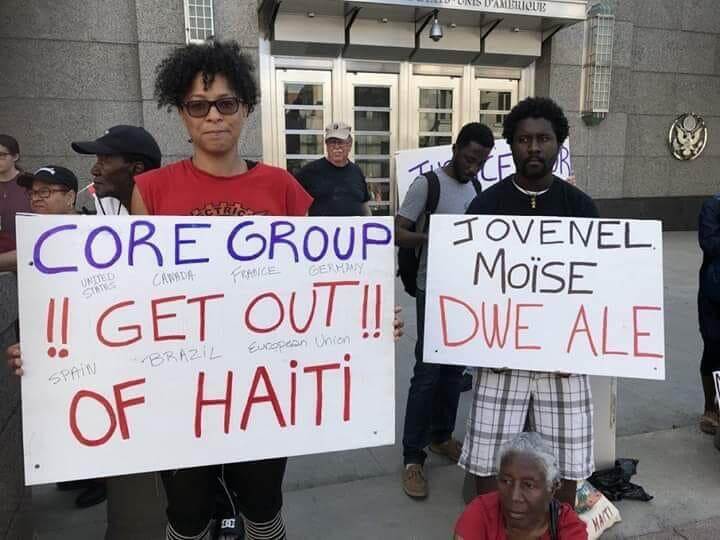Dealing with the domination of foreign countries, so-called friends of Haiti grouped around the United States, Canada, France, Spain, Germany, Brazil, the European Union, the United Nations and the Organization of American States (OAS), better known as the Core Group, the Executive Director of the Haitian Institute of Public Policy Observatory (INHOPP), Jean Gary Denis, denounced what he considers to be a group of ambassadors and heads of missions of international organizations, in an article published Wednesday, February 15, 2023, in the Dominican newspaper Listin Diario.
Instability, poverty, violence among other manifestations of the crisis that has become chronic in the country over the past fifteen years, are part of a macabre plan, in the opinion of the Haitian sociologist and historian who goes so far as to question the hidden interests of the Core Group to continue to feed this crisis, to maintain the same domineering behavior, through traditional interference to the point of no longer having any limits. This, in the opinion of the author, should be the subject of analysis or extensive research.
The Haitian historian, without tongue in cheek, launches directly: “The diplomats of the Core Group behave like real Taliban extremists in their struggle to prevent the progress and self-determination of the people,” he writes. He adds that “these Chaos extremists have an aversion to honest citizens and progressive sectors in the leadership of the state.”
Rightly, it is known to all that the so-called international community is on a mission to wage a merciless fight against extremism and terrorism. It goes without saying that the aprehension of the Executive Director of INHOPP will make people cringe. And that’s a good thing, because, the researcher argues, the manipulations of the Core are more effective and more likely to thrive with drug-dealing parliamentarians, smuggling entrepreneurs and corrupt officials.
Parliamentarians of the 49th and 50th Haitian legislatures justify such a position, when we know that the United States and Canada in particular have already taken draconian sanctions, if they are really sanctions, against former senators, former deputies and members of the Haitian economic sector more than decried in terms of criminality both on the economic and other levels.
It is not a question, explains the author, of denying the responsibilities of the corrupt Haitian elites in the current catastrophe, but it is important to underline in capital letter the historical responsibility of the international community, especially of the Core Group in our debacle, he argues, by basing his argument on first what he qualifies as the formalism of a democracy made to measure through false elections, then of Economic Development versus Assistan and finally of violence with gangs. This, notes the historian, contributes to the reduction of the quality of life of Haitians, with this chaotic diplomacy, according to his description.
According to the sociologist, the diplomacy of the cahos is rooted in the Haitian reality by the establishment of an anti-national and corrupt system, sponsored by the Core Group and the oligarchy. In other words, according to him, to be a leader one must be against the nation and have dirty hands, therefore anti-national. The very fact that the star singer of Sweet Micky was transported to the supreme magistracy of the Haitian state clarifies this positioning, according to Jean Garry Denis.
Furthermore, the author postulates that the reproduction of the mechanisms of poverty in Haiti goes through the humanitarian investment, justified by the cahos created by the Core Group. NGOs, big budgets, public finances, for nothing concrete, and so to speak, more misery, more catastrophe, so the mass is knocked out. It is as if the Core Group, according to this point of view of the Sociologist, behaves like a daring pyromaniac, setting fire to the building and then playing the role of fireman. Hence the permanence of assistance.
The governments in Haiti participate in institutional violence fueled by the weakening of the State as much as possible, thus creating a free field for monopolies and the creation of wealth for powerful economic groups, the author suggests. All of this, he says, is now achieved through this complement: gang violence. Free competition, so to speak, has been extinguished. With the federation of gangs in Haiti and international sanctions, the firefighters are still answering the call of the gang violence fire, according to the sociologist.
In this article entitled, Haiti and the diplomacy of the Core Group, the author believes that this group of countries called friends of Haiti through this more than complex structure could redeem itself by changing paradigm, but it was counting on their continued firm support to the government described as inept and corrupt of the meuro-chirugian, Ariel Henry, who became Prime Minister just after the villainous assassination of President Jovenel Moïse. And yet the Core Group pretends to encourage efforts to reach a consensus for a lasting solution to the crisis, writes the historian.
Furthermore, the author affirms that the government of Prime Minister Ariel Henry is reduced to soliciting foreign occupation of the territory to facilitate the transfer of power to a corrupt regime through false elections. Further on, he states that the authorities are using every strategy to justify the intervention, fuelling violence and weakening the national police.
What to fear the worst for the years to come relates Jean Garry Denis, estimating that the future of the Haitian people is on the table of sacrifices of the big interests of this world. He took the opportunity to invite the Haitian people to take responsibility for defeating the implementation of the diplomacy of chaos of the Core Group extremists. In his opinion, this must be done through the solidarity of progressive sectors in the world. A last element not sufficiently developed by the author, to the height of the problems described with regard to the diplomacy of the chaos of the Core Group, it is possible to note.
Guervens Ricardo Jean-Jacques







